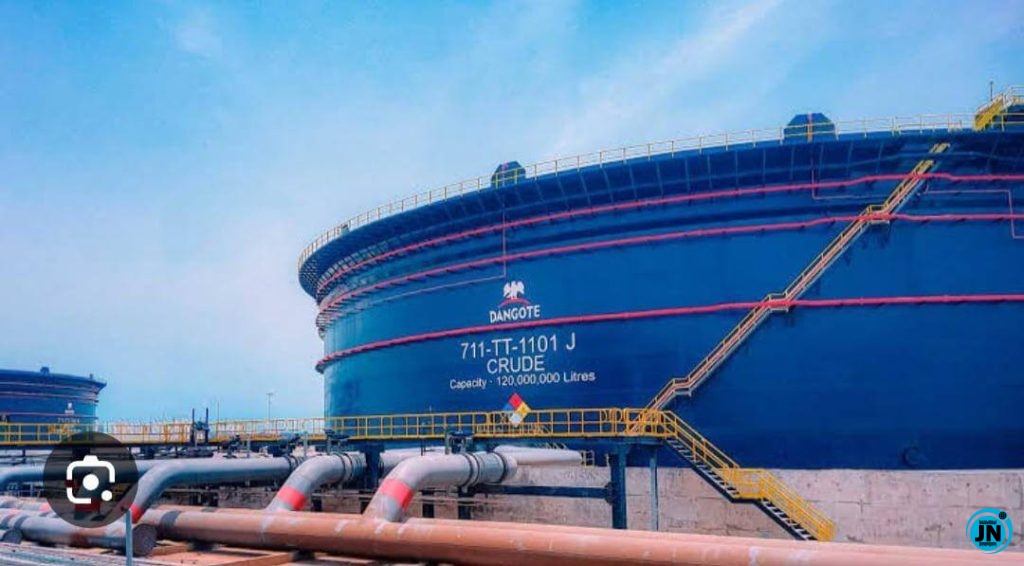The Dangote Petroleum Refinery has announced plans to significantly increase crude oil imports to meet production targets, as the Nigerian National Petroleum Company Limited (NNPC) struggles to fulfill the refinery's crude supply needs for its $20 billion facility based in Lekki.
According to officials from the refinery, current production has reached an impressive level of approximately 500,000 barrels per day (bpd), and efforts are underway to scale this output to the refinery’s full capacity of 650,000 bpd by June 2025.
While the naira-for-crude deal, an initiative introduced by President Bola Tinubu in 2024, remains operational, insiders from the refinery revealed to Punch that additional imports of crude oil are now deemed necessary to achieve the production goals. The sources, who spoke on the condition of anonymity due to a lack of authorization to disclose such details, emphasized the importance of these imports in maintaining uninterrupted operations at the facility.

The NNPC is currently providing 350,000 bpd out of the allocated 450,000 bpd meant for domestic consumption. This figure falls short of the refinery’s daily crude oil requirement of 650,000 bpd. As a result, refinery officials are compelled to secure crude supplies from external sources to bridge the gap. When asked if crude oil imports would continue even as NNPC’s own refineries are being reactivated, a refinery source confidently responded, “Absolutely! This refinery operates at 650,000 bpd. We’re ramping up production and will reach full capacity by midyear. Do you realize the scale of operations involved in processing 650,000 bpd?”
Another official elaborated on the magnitude of the refinery's operations, stating, “This is not a small-scale refinery processing 200,000 bpd. At 650,000 bpd, it’s a massive operation. Right now, we’re producing 500,000 bpd, and by midyear, we’ll reach our target. To sustain this scale, importing crude oil is a necessary part of our strategy.”
A consultant associated with the refinery described its significance on a global scale, remarking, “This refinery is a game-changer in the oil and gas industry. Very few refineries in the world, especially in Europe, operate at this scale. Even OPEC has acknowledged the impact of this refinery on the European PMS market.” The consultant further highlighted the refinery's commitment to producing high-quality fuel that meets Euro 5 standards, ensuring better performance and reduced environmental impact.
Naira-for-Crude Initiative
As Nigeria continues to expand its refining capacity, the 450,000 barrels of crude oil designated for domestic refineries have proven insufficient to meet the growing demands of facilities such as the Dangote refinery and others. Data from the Nigerian Upstream Petroleum Regulatory Commission (NUPRC) reveals that the combined daily crude oil requirement for the Dangote refinery, Port Harcourt refinery, and six additional refineries amounts to 770,500 bpd.
The NUPRC has indicated that Nigeria’s total refining capacity stands at 974,500 bpd, factoring in only operational refineries. In July 2024, President Bola Tinubu instructed the NNPC to begin selling crude oil to local refineries in naira, using the Dangote refinery as a pilot program. As other refineries such as the Port Harcourt and Warri facilities resume operations, they too are expected to join the naira-for-crude arrangement.
Projections by the NUPRC indicate that eight refineries will collectively require 123.5 million barrels of crude oil during the first half of 2025. The breakdown of daily crude oil requirements for these refineries is as follows:
Dangote refinery: 550,000 bpdPort Harcourt refinery: 60,000 bpd
Warri refinery: 75,000 bpd
Kaduna refinery: 66,000 bpd
Opac refinery: 5,000 bpd
Waltersmith refinery: 4,500 bpd
Duport refinery: 2,000 bpd
Edo refinery: 1,000 bpd
The Federal Government has announced plans to review the effectiveness of the naira-for-crude initiative in April 2025. The results of this review will determine the future direction of the program.
In a bid to address challenges associated with inconsistent local crude oil supplies, the Dangote refinery is in the process of constructing eight additional crude oil storage tanks. These tanks are expected to increase the refinery’s total storage capacity by 41.67%, reaching 3.4 billion liters. Devakumar Edwin, Vice President of Oil and Gas Business at Dangote Industries, stated, “To ensure seamless operations, especially when importing crude from international markets, we need to enhance our stockpile capabilities. Construction of the new tanks is underway, with four of them nearing completion.”
Although the NNPC is supposed to supply 385,000 bpd to the Dangote refinery as part of the naira-for-crude initiative, industry experts suggest that meeting this target remains uncertain. As Nigeria continues to ramp up crude oil production, local refineries are likely to rely on a combination of domestic and imported crude to sustain their operations.

